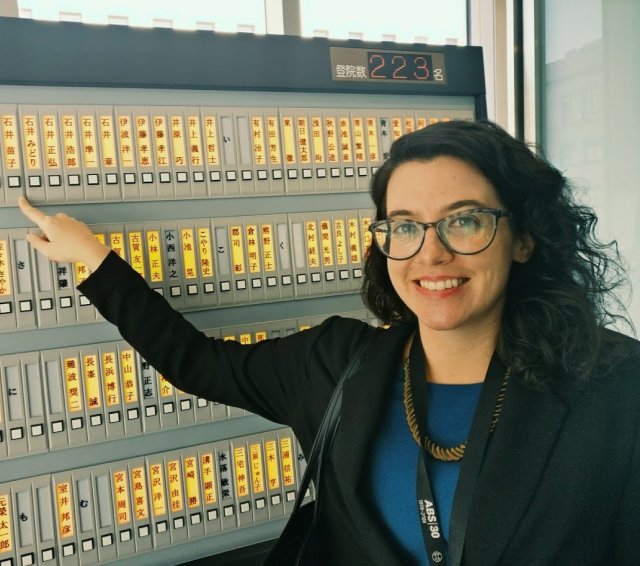Meet Environmental Engineer Sarah Watson

Sarah Watson is the Region 9 Superfund and Technology Liaison (STL) for EPA’s Office of Research and Development. Previously, Sarah worked as a Remedial Project Manager (RPM) in Region 9 on mining sites and federal facilities, including Carson River Mercury Site and Hunters Point. She also served as the Region 9 Superfund and Emergency Management Division’s (SEMD) communications liaison, preparing RPMs for interviews with the press. Sarah is an environmental engineer and has also worked on Polychlorinated Biphenyl (PCB) remediation in industrial and residential settings, evaluation of technologies for destruction of chemical weapons, and life cycle assessments.
In her free time, she enjoys being outside, reading, and traveling.
Tell us about your background.
I have a bachelor’s degree in chemical engineering with a Spanish minor from the University of Texas at Austin. During my undergraduate work I had the opportunity to do research in life cycle assessments and the Greenhouse Gas Emissions Inventory, exploring the potential of manufacturing jet fuel from switchgrass. I also have a master’s degree in civil engineering (with an emphasis in sustainable development) from the University of South Florida. I completed this program as part of the former Peace Corps Masters International program, so my coursework and thesis-writing were sandwiched by a 27-month Peace Corps service as an environmental health volunteer in rural Panama. My thesis title was Assessing the Impacts of Unrestricted Pesticide Use in Small-Scale Agriculture on Water Quality and Associated Human Health and Ecological Implications in an Indigenous Village in Rural Panama. Afterwards, I joined EPA Region 4 and worked on PCB cleanups and approvals as well as sustainable materials management. I had the privilege to be a Mansfield Fellow in Japan on detail for one year 2017-2018, where I worked with the government of Japan on a wide variety of environmental issues, including but not limited to climate change and the remediation from the Fukushima-Daiichi earthquake, tsunami, and nuclear disaster. In 2019, I came to region 9 and worked as a Remedial Project Manager on mining sites and federal facilities before joining the Office of Research and Development as the Region 9 Superfund and Technology Liaison.

When did you first know you wanted to be a scientist?
I first knew I wanted to be a scientist (or something like it) when I was a not-yet-Kindergartner watching the movie “FernGully: The Last Rainforest”. From then on, I knew I wanted to live in the rainforest (which I did, in the Peace Corps) and work to save the planet (ongoing).
How does your science matter?
The Superfund program at its core is about keeping people, often in very vulnerable communities, safe. Contributing to the science for complex remediation and cleanup issues ultimately helps us keep people safe and preserve the environment and nature as a public good to be enjoyed.
What do you like most about your research?
I love the range of research topics I get to study by being a Superfund and Technical Liaison. Being a researcher means being a lifelong learner, which excites me, and I love that my position gives me the opportunity to connect researchers and implementers across remediation work at the EPA.
If you could have dinner with any scientist, past or present, who would it be?
Marie Curie. I’d want to hear, from her perspective, what her work was like and her thought processes. I’d also want to discuss humanity’s relationship with radiation since her discoveries.
If you weren’t a scientist, what would you be doing?
I would be a writer—it’s always been a passion of mine and I have done some freelance writing and copy-editing.
If you could have one superpower, what would it be and why?
A photographic memory… to remember everything I’ve ever read, seen, or heard would make research much easier!
Any advice for students considering a career in science?
Get curious and talk to as many scientists as you can. There are so many different directions you can go in life as a scientist, and the amazing thing is that scientific skills are transferrable not only within the many different sciences we have in this world, but also different fields. Being a scientist makes you a fun person to talk with at parties, especially once you learn how to communicate well about your science!
What do you think the coolest scientific discovery was and why?
The internet came out when I was just old enough to grasp what it was, so I have to go with that… were it not for the internet, you probably wouldn’t be reading this page today 😊
What do you think is our biggest scientific challenge in the next 20/50/100 years?
Climate change, including a more equitable distribution of resources and wealth and the minimization of poverty. I do believe science will help us get to a more equitable world in all.
Whose work in your scientific field are you most impressed by?
Dr. John Cherry for his career of understanding groundwater, contamination, and sustainability issues not only on the large worldwide scale, but also on the village scale of use of portable wells for small scale drinking water systems in developing countries.
You’re stranded on a desert island with a community of other survivors – what is your job?
I pride myself on being a calming presence with a mind for breaking complex issues into smaller steps. I would be everyone’s ad hoc therapist and draw a process flow diagram of next steps for survival in the sand.
Editor's Note: The opinions expressed herein are those of the researcher alone. EPA does not endorse the opinions or positions expressed.
